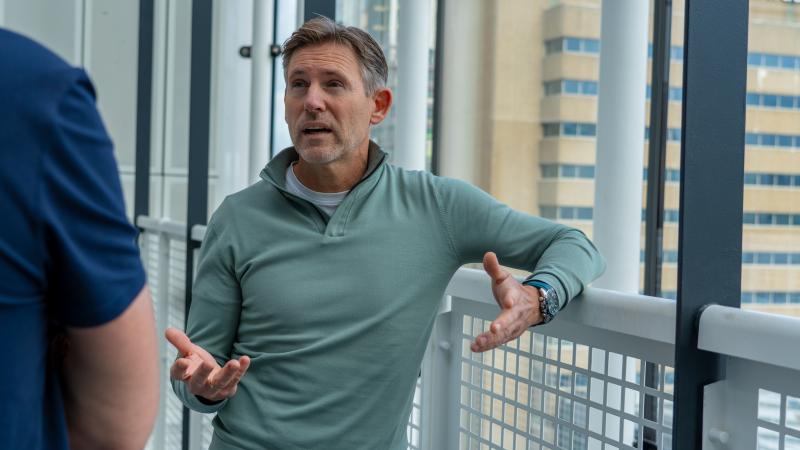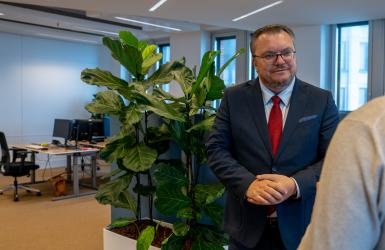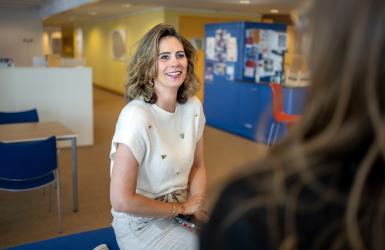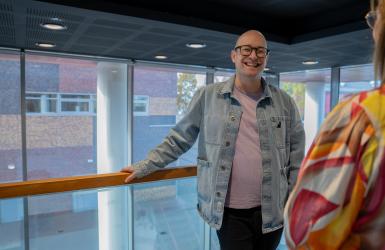The story of Diederick, corporate lawyer
‘We are the legal conscience of the IND’ Anyone who thinks the IND begins and ends with decision-making staff members is only seeing half…

Of course you can make great software working in the private sector too, but here you see the social value right away.
The IND’s information analysts are part of the ‘production house’, which falls under the Information Services (IV) Directorate. The production house develops applications to support IND employees in their work, as well as software that allows people to apply for a residence permit. Within the production house, professionals with different specialties, such as information analysts, work together in so-called scrum teams.
‘Can I explain what an information analyst does in simple terms?’ Marco chuckles. ‘I always tell my kids that I’m somewhat of an interpreter. Not so much between people who speak different languages, but between the worlds of practice and technology. I make sure those worlds understand each other and come together.’
‘The IND has highly complex customer processes, from applications to decisions on whether people are allowed to stay in the Netherlands. These processes are made up of lots of steps. Some of those steps are carried out manually, while others are automated. Together with the business analyst, who describes the processes, I make sure that systems are built in a way that makes them effective. What are our options? What information do we need? And how do we ensure that users can carry out their tasks quickly and efficiently?’
Marco and his team are building the IND’s future. ‘We’re working on a major overhaul of IV’s IT landscape,’ he explains. ‘Since the current system, INDiGO, is reaching its limits, we’re building a completely new, modular system under the Future Information Services (TIV) programme. It will be made up of individual components, making it flexible and easy to adapt.’
‘The IND wants to be able to determine the status of applications at any moment,’ Marco continues. ‘And not a day later, for example. That is why we need a system that’s able to instantly access current data, where all the components communicate with each other as soon as something changes in someone’s life. We want to know when someone gets married, has a child or submits an application. With the new system, we’ll always have access to the most up-to-date information, allowing us to make faster and more reliable decisions.’
In a few years, the IND will transition to a new IT system. But in the meantime, it’s business as usual. ‘And that affects our work,’ Marco explains. ‘Right now, we’re working on implementing the European Asylum and Migration Pact, which must be completed before the summer of 2026. That means we have to focus on the asylum process for the time being. We have to update that part of the system first.’
‘We’re going to carry out this transition step by step. It’s challenging, but we’re also learning a lot.’
Marco loves how dynamic his job is. ‘Things are always changing,’ he laughs, ‘because of a political decision, a new law or a humanitarian crisis. Sometimes we suddenly have to take in a lot of people from a war zone. All these changes have consequences for our systems, so we’re constantly making adjustments. Never a dull moment.’
‘I think that’s what’s so appealing about working as an information analyst at the IND,’ Marco continues. ‘We’re building things that matter – software that makes a real difference for our colleagues, but also indirectly for the applicants. And you get to see the results, which is great. We work in multidisciplinary teams that include developers, testers and a scrum master. But there are also legal experts, customer journey specialists and analysts. Everyone is pulling in the same direction, and you can feel that.’
Marco points out that he’s not the only contractor who has chosen to join the IND as a permanent employee. ‘I think that says something about the culture,’ he says with a laugh. ‘People enjoy working here. Of course you can make great software working in the private sector too, but here you see the social value right away. That’s what makes the work so rewarding to me.’
‘Those of us who work behind the scenes really care about what we do,’ Marco concludes. ‘I wish more people knew that. Everyone here is passionate about their job, and we all want to make a difference. At IV, we do that by helping our colleagues become even more effective and efficient. And that ultimately benefits the people who come to the IND for help.’

‘We are the legal conscience of the IND’ Anyone who thinks the IND begins and ends with decision-making staff members is only seeing half…

'Healthy and happy staff' When Evelien joined the IND in 2016, she only planned to spend two years here to gain experience.…

‘A single conversation can change someone’s day, week, or even their life’ Anyone who contacts the IND with questions about an application, a residence permit, or…